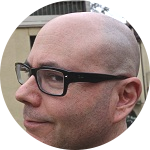In a new four-part series, Joel Schalit will be looking at religion, culture and race in today’s Europe. Celebrating diversity, bemoaning intolerance, the Israeli-American journalist begins at home, in Berlin.
Nazis in an immigrant neighbourhood?
Placed on a traffic island on the Sonnenallee, in the heart of Berlin’s Palestinian quarter, the advert promised 25,000 euros in exchange for information on surviving Nazi war criminals.
It stood out for a number of reasons.
Why here and not in Rostock? What would German-Palestinians know that ethnic Germans wouldn’t?
Featuring a black and white photograph of Auschwitz’ main gate, with the words “Operation Last Chance,” written in English, at the top, and the German “Spät aber nicht spät” (“Late, but not too late”) superimposed over train tracks leading into the lager (camp), the poster is politically challenging.
“Spill the beans,” it screams out, “and you’ll be financially rewarded.” As if turning ex-Nazis in, for moral reasons, was not enough. Money would work where politics had failed.
Posted throughout Berlin, as well as in Cologne and Hamburg, in July, the ad has something of a Wild West feel about it, as though it were a 19th century American Wanted poster in 21st century European clothing.
Given how off the civilizational grid Berlin can seem, the decision to post it here is understandable. Twenty years after the Cold War, there is still something untamed about the city.
The other Berlin
The Nazi genocide was also planned here. Surely there must be a few responsible parties hiding out in the vicinity. Or people who would know about them.
Nevertheless, Berlin also remains thought of as a “red town”, a refuge of the left – in more ways than one – replete with some of the most multi-ethnic, immigrant-filled boroughs in Europe.
Not just any immigrants, but Middle Easterners.
In my neighbourhood of Neukölln, you will find many Palestinians. Short of Europe’s Jews, they are amongst the most iconographic victims of the Second World War.
Not directly, but as a consequence of the refugee crisis instigated by the Nazis, which brought Zionist settlement in Palestine to a boil.
Yet, no Arab community is as vilified as the Palestinians for its wartime conduct.
The Grand Mufti of Jerusalem, the leader of the Arab community in Palestine at the time, is the bogeyman.
A nationalist, Haj Amin al-Husseini exerted a significant influence on Jewish-Arab tensions between the two world wars.
During the Second World War, Husseini actively supported Hitler’s genocide, as well as worked with the infamous Adolf Eichmann, in a number of capacities.
Husseini’s version of Islam impelled him towards anti-Semitism, and drove him into the arms of his Hitler –or so the rightist arguments go.
Hence the requirement of armed struggle, in order to settle Jews in Palestine, and why, the fight against the Palestinians was inseparable from the effort against German Fascism.
Over the last decade, Husseini’s relationship with the Nazis has also found its way into neoconservative arguments about Islamo-fascism, and the origins of contemporary Muslim radicalism.
It’s similarly helped explain Palestinian collaboration with neo-Nazis, during the 1972 Munich Olympics attack.
Hence, the charged nature of the advert on the Sonnenallee. It feeds into such histories in all kinds of discomfiting ways, indicting my neighbours, however indirectly.
If they’re even aware, that is, of the politics attributed to them, which align Palestinians with Fascists.
Never mind the fact that contemporary German extremists have no interest in collaborating with immigrants, particularly those of Middle Eastern heritage. To them, Islam is as bad as Judaism.
Nor the fact that Palestinians tend to be equally disinclined.
This is all about Europe
It would seem that the organisation responsible for this poster campaign, the Los Angeles-based Simon Wiesenthal Center, did not intend to target Berlin’s Palestinians as such.
Still, Holocaust remembrance – or the kind indulged by Wiesenthal – isn’t known for its nuance or its sensitivity towards the details of local life.
Germany is Germany. Whether the adverts get placed in Muslim neighborhoods or not isn’t something that necessarily concerns them.
It’s more about Europe, albeit memory of an older Germany, forever bound in Holocaust time. The urgency communicated by the advertisement’s reward offer says it all.
With the Holocaust generation in its twilight years, there aren’t a lot of guilty parties left to convict. That may be of little use to survivors who seek final closure.
However, that’s no excuse to tolerate the excesses of adverts like this.
Few European minorities remain subject to the same kind of discriminatory logic that caused the destruction of the continent’s Jewry than Muslims.
Especially in Germany, where Islamophobia often functions as a proxy for anti-Semitism. Why play into that, however unknowingly?
If we’re going to contribute to the restoration of European diversity, which the Nazis worked so hard to destroy, it behoves everyone to be more thoughtful.
Anything less than that risks scapegoating communities on the margins, just like Europe’s former Jewish community once was.
Considering how much that dynamic seeks to reassert itself today, during the economic crisis, it’s always a risk, one which carries with it enormous historical baggage.
Particularly in places, like Germany, which speak so strongly to genocide.









